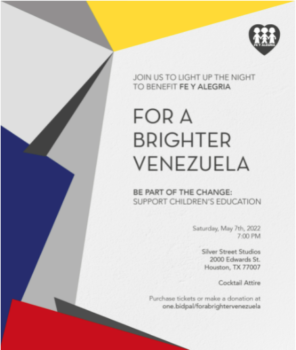The impact of Fe y Alegría, which was founded in Venezuela over 65 years ago, has always been felt beyond its direct work with marginalized and vulnerable communities. Ask any Venezuelan–on the streets of Miami, Madrid, or Maracaibo–and they will tell you their “Fe y Alegría story”. Through its connections with many public and private institutions, including the Catholic Church, Fe y Alegría has brought individuals together in collaboration in two ways: 1) the annual raffle and 2) community programs, which allowed students to visit Fe y Alegría schools to learn how the organization supports marginalized communities.
Even years later, many Venezuelans recall their experience with the annual raffle and how this special time of the year would fill their hearts. Regardless of where they are now, Fe y Alegría, the raffle, and its little red heart transports Venezuelans of all ages and backgrounds back to that sense of community and belonging. This is the case of Carolina Domínguez, María Alecia Klemprer and Mariana Bustillos, three friends from Venezuela who now live in Houston, Texas. Living outside Venezuela for a number of years, the trio had a growing sense of longing to contribute to the future of their home, in any way shape or form.
“When we became familiar with Magis Americas and Friends of Fe y Alegría in the US, we immediately felt compelled to work together,” said Dominguez.“There was trust in the platform, process and institutionalization of the organization that is not easy to find when working with organizations in Latin America.”
This clear connection to the impact and history of success by Fe y Alegría, as well as the security and transparency provided by Fe y Alegría’s relationship with Magis Americas, it’s long time U.S. partner and fiscal sponsor, allowed Dominguez, Klemprer and Bustillos to realize that this was the perfect opportunity to take action and support their country and its future generations.
Thus, with the support and guidance of Jesús “Txuo” Rodríguez Villarroel, S.J., executive director of Fundación Unidos en la Misión, the Light Up the Night: For a Brighter Venezuela gala was born.
In its first year, in 2019, the gala was a complete success. It gave participants the chance to contribute with friends and family, not only as Bustillos said, to “see that [their] little grain of salt, translates into the smiles on kids’ faces, joy”but also to see a direct line of support to Fe y Alegría as it continues on facing challenge after challenge. It was a true celebration of the work of Fe y Alegría and a moment in which individuals came together for a Brighter Venezuela. To the organizer’s surprise, the event also had strong support and participation from individuals who were not from Venezuela, but who had a strong connection to the country. It gave everyone a chance to get involved.
This year, after being postponed twice due to the ongoing COVID-19 pandemic, the Light Up the Night: For a Brighter Venezuela gala is back to give individuals a chance to remain connected to the needs of Venezuela and contribute to the organizations working towards solutions. The gala will be inspired by Venezuelan culture through its ambiance and music, dancing and celebrating.
To learn more about the Light Up the Night: For a Brighter Venezuela gala, as well as purchase tickets, sponsor and/or donate, click here.
The gala will take place at the Silver Street Studios (2000 Edwards St., Houston, TX 77007) on Saturday May 7, 2022, at 7pm.
